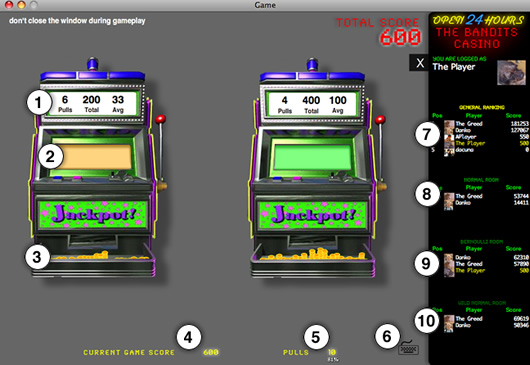
| Search the list | Add your own study to the list | Web-Lab | Publications |
|---|


archived |
Cognitve Psychology | :: 27. 05. 2008 :: | |
| :: | Sequential decision-making under uncertainty in a video game | ||
| Paul Schrater, Daniel Acuna Department of Psychology, University of Minnesotaonl |
|||
| If you agree to be in this study, we would ask you to do the following things: play games that involve decisions over uncertain rewarding alternatives.
You will be asked to simultaneously play several virtual slot machines that give you points in a random fashion (much like simultaneously playing several real slot machines in a casino where you do not know which machine is the best).
For each game, you will have the opportunity to pull the levers a randomly limited number of times. This is, 2 out of 100 pulls may randomly stop the current game, making you collect the points, and playing the next game. This does not mean that the probability of ending the game increases over time, but it stays fixed. For example, if you survived the pull number 4, you need to think that you have to have survived the first, second, and third pull, each of which has a 2% probability of stopping the current game.
You will be asked to play 48 of these games separated into 4 stages, each of which will have different number of machines and different payoff behaviors. Keep in mind that each set of games is different for each subject. Each game typically involves 1.5 minutes of playing, but you can take as much time as you want.
Moreover, you can play each game any time you want, spaced over a period of time. We would not be surprised if you play either all the games consecutively or just one per day. We expect solving all games would take 60 min of game play, but again, you can take as much time as you want.
Video game |
|||
|
|
|||
 1 |
|||